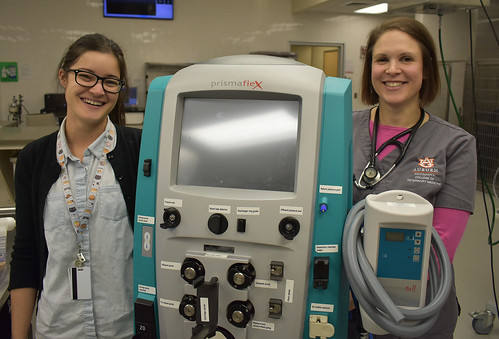Auburn College of Veterinary Medicine Emergency Services and Critical Care on call 24-7 and throughout the holidays
Article body
"I could not thank [Auburn University College of Veterinary Medicine] enough for providing [my pet] with her care and being so dedicated in [her] recovery."
Such testimonials are common for the college to receive from its pet-loving clients. During this holiday season, many are traveling with their pets–and accidents do happen. When they do, the college’s Emergency and Critical Care Service is on duty 24/7 with a fully-staffed medical unit and advanced emergency care services and capabilities.
The opening testimonial came in an email from Haley Alderman of South Carolina, whose miniature dachshund, Lainey, was struck by a vehicle during the summer. The accident occurred during Alderman's visit with family in Florida. The 2-year-old dog unexpectedly leaped from Alderman's car into a busy road and was struck by a trailer being pulled by an oncoming truck. The animal suffered severe injuries to her back leg and pelvis.
"I rushed her to a local emergency vet clinic," Alderman writes. "It was determined that Lainey would need to be transported to a vet that could address her needs. There was no doubt that we were choosing Auburn."
"Lainey was in shock when she arrived here," recalls Dr. Katie Nash, a resident in Emergency and Critical Care and one of the Auburn veterinarians who treated Lainey. "We stabilized her and worked with her several days in our Intensive Care Unit to manage her pain and treat her injuries."
Lainey underwent surgery to repair her damaged leg and pelvis and was able to be discharged to her owner and the care of her primary veterinarian back in South Carolina.
This type of pet referral and treatment success story is typical at Auburn’s Emergency and Critical Care Service, located in the Wilford and Kate Bailey Small Animal Teaching Hospital.But a pet owner does not have to be referred by a veterinarian to use the Auburn hospital.
"Pet owners can just come in with their injured or sick pet," said Dr. Lenore Bacek, a clinical assistant professor in Emergency and Critical care and also one of the veterinarians who treated Lainey.
"We have critical care and other specialists on duty around the clock," Bacek said. "We serve emergencies whenever they happen. And during this holiday season, we are open, staffed and ready at all times."
In addition to its fully staffed medical unit, Auburn’s Emergency Services and Critical Care has capabilities not generally available at most ordinary veterinarian clinics.
"We have such equipment as mechanical ventilators, dialysis for continued renal replacement therapy and a new hyperbaric oxygen chamber," Nash said. "We can treat all types of pet emergencies."
"We offer emergency and critical care, collaboration with other services, support services, 24-hour care, as well as advanced care capabilities," added Bacek. "We also can take consulting case calls from local veterinarians around the clock."
The clinic is located on the campus of the College of Veterinary Medicine at 1220 Wire Road in Auburn. The emergency phone number for the Small Animal Clinic is 334-844-4690. Additionally, the emergency clinic for large animals is also located on the college campus in the J.T. Vaughan Large Animal Teaching Hospital at 1500 Wire Road. Its emergency phone contact number is 334-844-4490.
Related Media
Media interested in this story can contact Communications Director Preston Sparks at (334) 844-9999 or preston.sparks@auburn.edu.
Auburn University is a nationally ranked land grant institution recognized for its commitment to world-class scholarship, interdisciplinary research with an elite, top-tier Carnegie R1 classification, life-changing outreach with Carnegie’s Community Engagement designation and an undergraduate education experience second to none. Auburn is home to more than 30,000 students, and its faculty and research partners collaborate to develop and deliver meaningful scholarship, science and technology-based advancements that meet pressing regional, national and global needs. Auburn’s commitment to active student engagement, professional success and public/private partnership drives a growing reputation for outreach and extension that delivers broad economic, health and societal impact.






